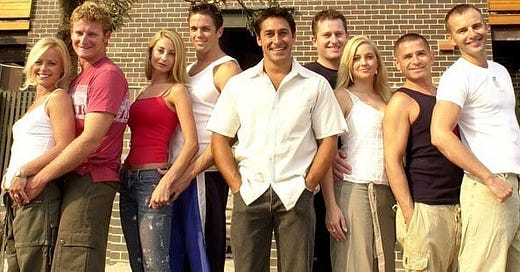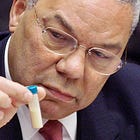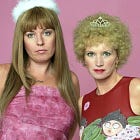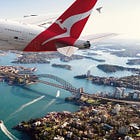2004: Crash and burn
Australia lurched to the right, I ran out of money, and humiliation beckoned.
Remember that 2006 book The Secret? It took the world by storm with its mumbo-jumbo about how things would happen if only you thought them, no other effort required. It was a genius idea: that some universal “law of attraction” meant “whatever you experience in life is a direct result of your thoughts.”
“It really is that simple,” two psychology professors wrote in the New York Times four years later in a scathing review of the book’s follow-up, The Power. “If you think about being fat, you will get fatter. If you think about thin people, you will become thin yourself. If you think about your bills, you will get more bills, but if you think about checks instead, your mailbox will overflow with them.”
It’s a total crock, of course. But two years before Australian author Rhonda Byrne cashed in on people’s desire to get everything for nothing, I was an early adopter of manifestation. My theory was that if I dressed like a successful freelance writer, sat in coffee shops like a successful freelance writer, and spoke and acted like a successful freelance writer … voilà! I would be a successful freelance writer.
You can guess how this ends. I was so unsuccessful that by the end of 2004, my bank accounts were dry, the credit cards loaded, and my parents were buying me a one-way ticket to Melbourne that had a layover in Stockholm, where I probably should have escaped the airport and followed the northern lights to my demise in the Arctic circle.
But that’s not how the year began. I’d finished my time as New York Correspondent for the Australian Financial Review, confident a writer of my obviously immense talent would be a hot commodity. Of course, there was a hitch in my plan: succeeding required actually writing and having some semblance of discipline. I was all hat, no cattle. I had a column in Melbourne’s Herald Sun that fooled me into thinking I was making a living, plus odds and ends in other publications that merely slowed the draining of my finances. Yet it ended, as Ernest notes in The Sun Also Rises when the writer Bill asks Mike Campbell how he went bankrupt, “Two ways. Gradually, then suddenly.”
Back home, there was similar phenomenon. After the Liberal-National Coalition was elected to its fourth straight term, prime minister John Howard suddenly found himself in complete command: for the first time since 1981, the Coalition had control of the Senate. What had been a gradual creep of conservatism—bad policy masked by an inflating housing bubble and anemic opposition—was now suddenly able to be fully realized. The result? Overreach and apathetic voters suddenly understanding what Howard was about, even if it had been obvious to anyone truly looking.1
Most notably, the Coalition banned same-sex marriage. This wasn’t in response to anyone actually getting married: it was preemptively reacting to developments overseas, including here in the US where same-sex marriages began being performed in Massachusetts in May 2004. So, Howard and his troglodytes passed the Marriage Amendment Act, which defined marriage as “the union of a man and a woman to the exclusion of all others.” Yes, this was just 20 years ago. In Australia.2
At the same time, the High Court declared indefinitely detaining immigrants—including children—was legal, completing what has become in the two decades since the quinella of hot-button social scare tactics. Want to win an election? Declare immigrants are coming to kill you and take your job. Oh, and that God made Adam and Eve, not Adam and Steve. In a democracy, beware the lizard brain.
But who cares about basic human rights when my attention addiction can be fed with sweaty people giving each other brain damage? What really mattered in 2004 was that my Canterbury Bulldogs won the National Rugby League premiership and Port Adelaide, which I’d supported as a wee nipper in the South Australian Football League, nabbed the AFL crown. Add to that 17 gold medals at the Athens Olympic Games—I have no idea who Jodie Henry is, though—and you have a pretty decent year.
OK, some dark clouds were looming. It’s interesting to look backand see how what we’re dealing with today was beginning to fester. Reality TV was starting to take over, with Australia increasingly addicted to US imports like Australian Idol (which debuted in 2003) and Big Brother. The Block was also hitting its stride in its second year, although it never really took off in the States.3 Still, it really feels like 2004 was an inflection point: the year when reality TV went from being something of a freaky sideshow to a legitimate form of mainstream entertainment. And when networks figured out how much cheaper it was to produce? The floodgates opened.
Of course, none of this was evident to me in New York City. My parents visited and I remember three things: how much I needed to see them; how a crazy Manhattan driver almost ran them over and then confronted me when I slapped his car with my hand and said “you almost fucking ran my parents over” (I think he was very unsuccessfully trying to look macho in front of his girlfriend); and me sleeping on the floor of my studio apartment on Thompson Street while they took my bed, my dad perpetually tripping on me as he made his way to the bathroom during the night. What I’d give for one more night with my dad tripping over me.
As the year drew to a close, the jig was up. Outgoings were way higher than incomings. I was skinny as a rake, subsisting on lattes and bagels with cream cheese. My credit cards were tapped out and I couldn’t work for American companies as my visa only allowed me to be a journalist for overseas media. Meanwhile, I’d submitted a phone-book sized document to get my green card as an “Alien of Extraordinary Ability” (with a letter of recommendation from Lachlan Murdoch, which is kinda embarrassing now), but all signs were it could be a year or longer before a decision was made given the immigration department was still coping with a massive post-9/11 backlog.
So, I called it. I gave up my lease, shoved the little I owned into a storage unit deep on the west side, and flew home. I needed the comfort of people who loved me and the reassurance I was more than just a massive failure; that while New York City had whacked me around the head for the better part of a year, my core skills remained and better times had to be ahead. Surely.
About this series: Australian almanac
This is part of a series of articles examining what the heck has happened in Australia in the 23-odd years I’ve been living in the United States. The introduction to this series is here, and related posts below:
When voters finally figured that out, they bounced Howard like a bad cheque. He held off calling an election until the last possible minute and the Labor Party under Kevin Rudd swept to power in late 2007, with Howard himself becoming only the second sitting prime minister to lose his seat (to Maxine McKew!).
Same-sex marriage became legal in Australia in December 2017 following a voluntary postal survey where 61.6% of respondents supported changing the law to allow same-sex couples to marry. I wasn’t there, but three things. You mean to tell me almost two-in-five Aussies in 2017 still didn’t support gay marriage? Second, you mean to tell me almost two-in-five Aussies in 2017 still didn’t support gay marriage? And third, you mean to tell me almost two-in-five Aussies in 2017 still didn’t support gay marriage?
The Block is also a bellwether of the insane Australian property market. The format is simple: teams separately renovate identical properties, which are then sold at auction. Whoever gets the most money wins. In season one in Bondi, the winning profit—the amount the winning seller cleared—was $156,000 and the combined profit from all the apartments sold at auction was the $443,000. In last year’s season on Phillip Island, the winning profit was being $1.55 million and the total profit from properties sold $5.33 million.






